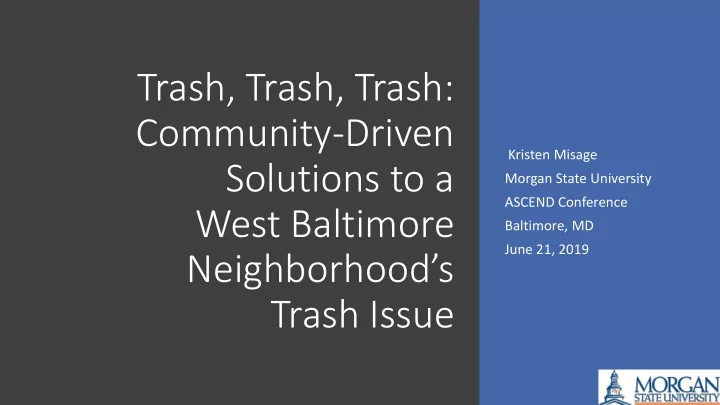

Trash, Trash, Trash: Community-Driven Kristen Misage Solutions to a Morgan State University ASCEND Conference West Baltimore Baltimore, MD June 21, 2019 Neighborhood’s Trash Issue
Franklin Square Historic neighborhood Vibrant community association Engaged community partner
Purpose Objectives Improve • Utilize the research process neighborhood health as a community engagement outcomes and tool quality of life of residents. • Develop strategy to address neighborhood trash
Southwest Baltimore: Race Demographics 2010 Census Franklin Square Baltimore City % Renter 74.7% 52.3% Median Household $21,550 $39,386 Income % over 25 with a BA or 4.2% 25.2% higher % in poverty 38.3% 21.3% Median Home Value $95,000 $160,400 (based on a sample) Source: Baltimore City Department of Planning (2014); Baltimore Neighborhood Profiles: data from the 2000 census, 2010 census, and 2006-2010 American Community Survey. Source: Baltimore Neighborhood Indicators Alliance, 2016 Vital Signs
A Significant Challenge • Vacant houses crumble into debris • Vacant lots provide sites for illegal dumping
Consequences of Trash • Health impacts: rats, mosquitos, disease, stress • Environmental impacts: trash and pollutants potentially flow into the Bay • Crime impacts: disorder, may increase more serious crime • Cost to city: larger piles require Bobcats and dumpsters, cameras, extra enforcement • Cost to residents: lower home values, disinvestment
Community-based Participatory Research • Community-led agenda • Residents introduced us to the issue, recruited focus group participants • Residents heard of the project and called to join • Surveyed residents, connected us to participants, ambassadors to the neighborhood • Residents will aid in disseminating the results • Empowerment /education for the community
Building Community Capacity • How to build community capacity? • Appeal to principles and altruism • Motivate with a targeted campaign • Build social infrastructure • Involve the community in investigating/combatting challenges (CBPR)
Community-based participatory research project Methods A mixed methods design Quantitative: survey Qualitative: three focus questionnaire of 102 groups households or 5.5% of all households
n Percent Gender: Female 9 50.0 Male 9 50.0 Age Group: 35-50 year olds 4 22.2 51-69 year olds 9 50.0 70 and older 5 27.8 Race/Ethnicity Black or African American 15 83.3 Focus Group White or Caucasian 3 16.7 Income: Demographics Less than $20,000 5 27.8 $20,000 – 49,999 4 22.2 $50,000 – 74,999 2 11.1 $75,000 or more 6 33.3 Housing tenure Rent 4 22.2 Own 12 66.7 Ever called 311 Yes 14 77.8 No 3 16.7 Total sample 18 100.0
Major themes: Focus Group Findings 1. Root causes of trash issue 2. Individual/Community THERE IS WAY TO MUCH TRASH ON THE GROUND. I efforts towards clean up REMEMBER MY 4-YEAR OLD MENTIONED IT. HE SAID, “HOW COME IT’S SO DIRTY? HOW COME IT’S NOT DIRTY WHEN WE GO OTHER PLACES?” 3. Top down solutions to trash issue - Community Member 4. Bottom up solutions to trash “...THE GARBAGE IS A SERIOUS PROBLEM AND issue IT MIGHT RUN ME OUT OF HERE” - COMMUNITY MEMBER 5. Health implications of trash
Verifying community effort
n Percent Gender: Female 61 62.24 Male 37 37.76 Age Group: 18–34 year olds 16 16.33 35–50 year olds 19 19.39 51–69 year olds 53 54.08 70 and older 10 10.20 Race/Ethnicity Black or African American 94 94.9 Survey White or Caucasian 4 4.04 Other Race 1 1.01 Demographics Income: Less than $20,000 46 54.8 $20,000 – 49,999 28 33.3 $50,000 – 74,999 7 8.33 $75,000 or more 3 3.57 Housing tenure Rent 59 62.8 Own 35 37.2 Ever called 311 Yes 50 51.0 No 48 49.0 Total sample 99 100.0
Survey: Root causes of trash
Low incidence of exposure to rats/ailments associated with rat exposure. 18 respondents indicated asthma . Survey: Health How do you feel about the presence of effects trash in your neighborhood? Frustrated 63% Angry 38% Overwhelmed 36% Defeated 22%
Survey: Evidence of effort (and future effort)
400% Survey: increase Evidence of effort (and future effort) 40% increase
86% Who is responsible for trash clean up? said “Everyone” Percent of Community-based DPW or City-based Respondents 71-90% Teach young people not to litter, work Trash pick-up twice per Survey: with neighbors, host block and week; have schools teach neighborhood clean up days, call 311 kids not to litter; employ at first sight of trash young people, homeless, What can residents to pick up trash; be done? get the Mayor involved 60-70% Meet with Councilman Bullock Use inmates to pick up trash; run commercials about not littering; more bulk trash days; more public trash cans 59% or less Take overflow trash to dumpsters Consistent recycling pick up
Survey: Prevention
• Trash is a clear detriment to this community, with some geographic variation • Evidence of community effort • Preliminary evidence that education is valuable Summary • Still systemic issues: vacant units, illegal dumping • Need more investigation into top-down effectiveness
• Explore barriers for small haulers • Utilize survey results to develop with the community a tool to address the trash issue at the neighborhood level Next steps • Disseminate findings to Franklin Square, Mayor’s Office, DPW, and The Baltimore Sun • Further research: photovoice to engage youth on trash?
Possibilities for community tool Neighborhood connection Identification Educate Illuminate context residents systemic issues Health/ Equitable Ways to detail services / fair environmental respond policies effects
Tonya Sanders-Thach, PhD. Associate Professor City and Regional Planning School of Architecture & Planning Tonya.Sanders@morgan.edu Questions & Kristen Misage Feedback Masters Student City and Regional Planning School of Architecture & Planning krmis2@morgan.edu
Recommend
More recommend